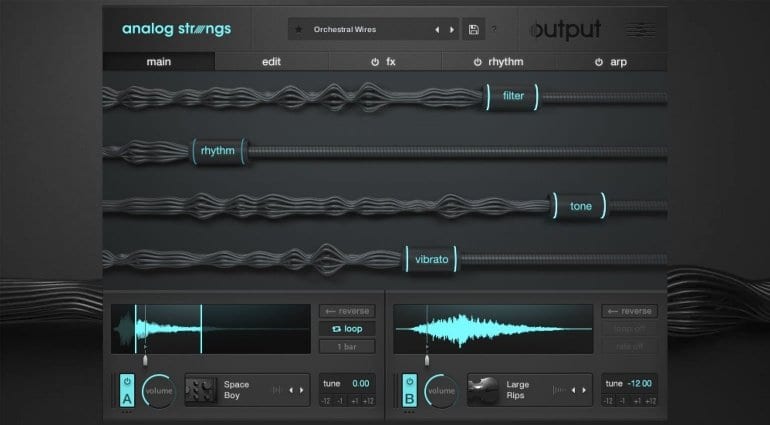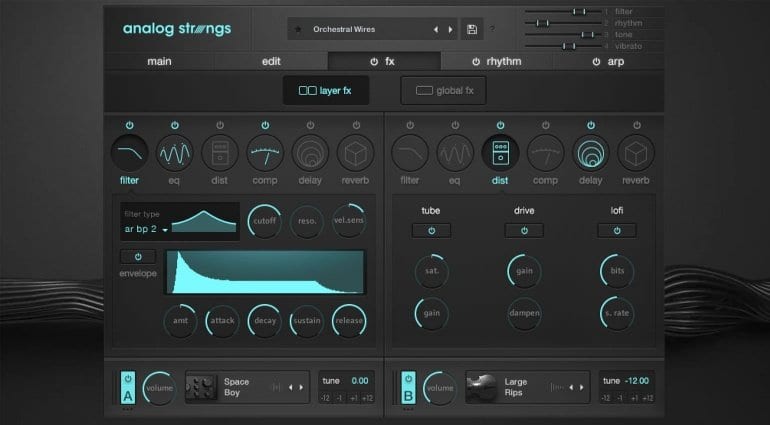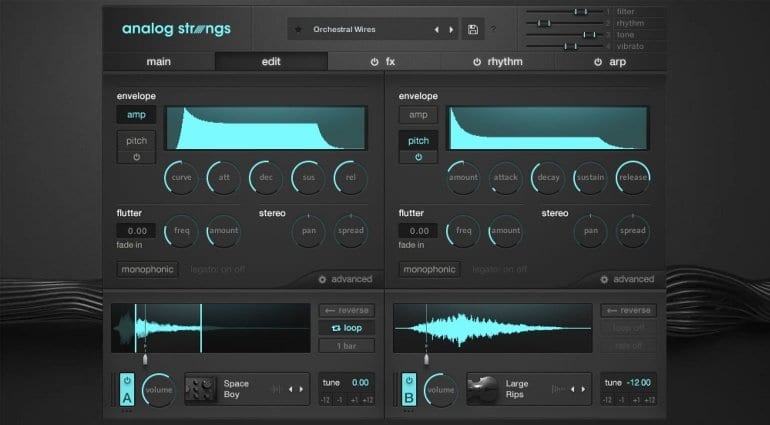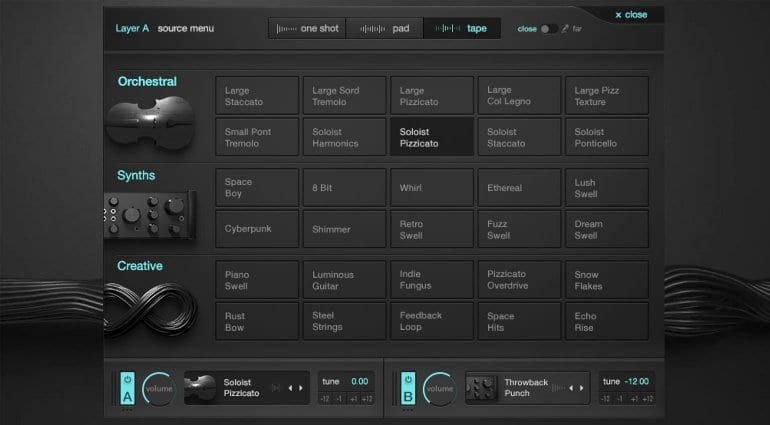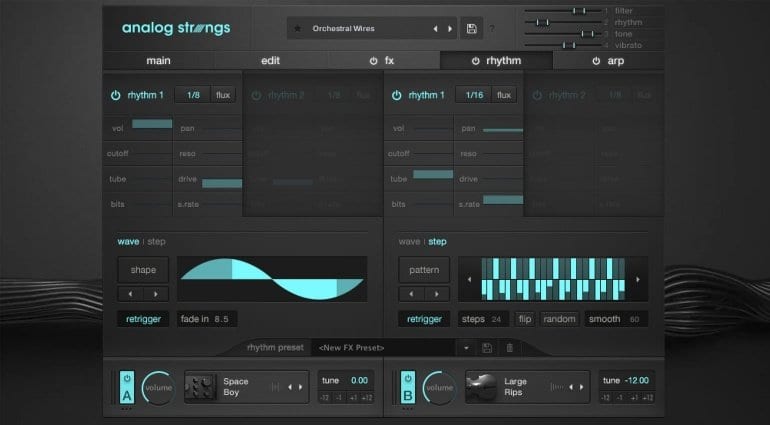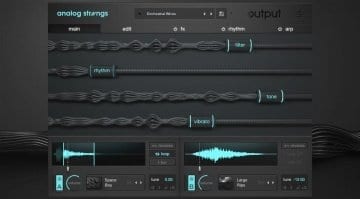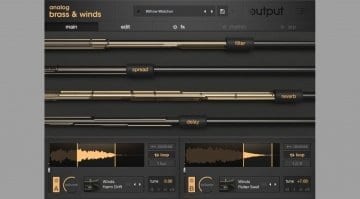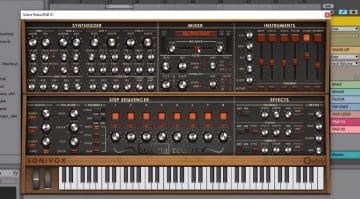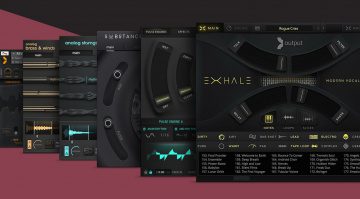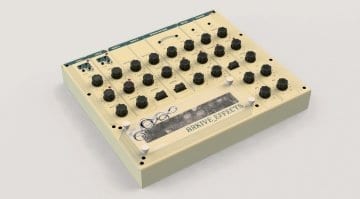Analog Strings with a throbbing twist from Output
Output do produce some lovely looking plug-ins. Their style and eye for GUI design manages to set them apart in a very samey software industry. Their latest release, Analog Strings, is no exception as the website treats you to a throbbing, pulsing rope of what looks like strands of liquorice. As the tag-line says “Everyone has string samples. This is different.” Let’s hope so because I too am a trifle bored with virtual strings.
Analog Strings
“Insanely unique” is the startling term they use and I confess to quite liking it. It certainly doesn’t look like many string libraries. Those four wire rope things are fabulous. I’m sure a simple knob or slider would have sufficed but why have that in a virtual world where anything is possible? No no, we want fraying wire liquorice with woggles to control our filter, rhythm, tone and vibrato. The only slight disappointment is that this, like their other instruments, runs inside Kontakt. That’s fine and everything, it’s just kind of a restraint and after a nicely unique initial experience you kind of know the features that will lay behind – because they are very similar on all Kontakt instruments.
However, what’s important is what this can bring to the table in terms of sonic excitement.
Three Sources
Analog Strings comes with a stonking 36GB of sound library. This is taken from three distinct sources. First of all there’s the terrible deep, achingly sampled and authentically recorded orchestral strings. 60 and 22 piece orchestra, some hall in Budapest yada yada yada – all standard string sampling stuff. Combined with that is a selection of synthesized strings taken from vintage synths “known for their string sounds”. So presumably gear like the ARP Solina, Roland RS-202 and Moog Opus-3, but they don’t actually specify. And finally, they’ve added in some more esoteric or what they call “Creative” elements such as plucked piano, tape noise, feedback, guitar resonance and a lot of other fun stuff.
If nothing else the combination of sounds makes for a very intriguing instrument. I think this could be immensely enjoyable.
Features
Following the regular Kontakt format Analog Strings gives you a great front end with those four macro controls that you’re going to play with a lot. Then there are edit, effects, rhythm (modulation) and arp (arpeggiator/sequencing) pages available via tabs at the top. It comes with 500 presets and has the usual tagging system to track down the sort of sound you’re after. The sound is made up of two combined sources of which there are 90 individual ones to choose from. These are split into three types: one-shot, pad and tape loop. The tape loops are quite interesting in that you can edit start and end points, and change play direction on the main page.
One smart feature is that when you navigate away from the main page into the editing pages the four macros appear as sliders at the top right. This means you always have access to those main sound altering options without having to change pages – nice. In the effects page you find all the usual suspects of filter, EQ, distortion, compression, delay and reverb. You can add effects to both layers separately and globally where you’ll also find a phaser and chorus.
On the rhythm side they’ve borrowed heavily from their Movement plug-in and offers multiple LFO shapes and step-sequencing options to really great effect. They’ve pushed their “Flux” technology further to give you control over 8 competing and evolving steps. There’s a lot of power within the rhythm section to pull out some super dynamic and fluid soundscapes. The arp section brings the same sort of rhythmic power to the melody. You can create all sorts of velocity aware sequences or chord shapes.
Is this different?
The interface and feature set will be very familiar to anyone who has a handful of Kontakt-based instruments. So in that regard, the beautiful looking interface doesn’t bring anything particularly innovative. However, the combination of sound sources is really interesting and well thought out. Output’s modulation and flux engine is, without a doubt, completely awesome and can take the dullest source material and make it dynamic, expressive and enormous. These things are what makes Analog Strings worth looking at even if your system is dripping with gigabytes of strings already.
Analog Strings is available now for Kontakt or Kontakt Player for $199 and comes with a 14-day money back guarantee. If you don’t like, just return it – not something you see applied to software very often. More information available on the Output website.
You are currently viewing a placeholder content from YouTube. To access the actual content, click the button below. Please note that doing so will share data with third-party providers.
